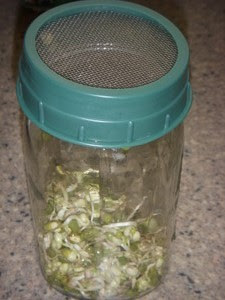 Recently our family has learned to love sprouts. My two year old will stand at the fridge and beg for "sprouts, sprouts, sprouts" until someone gets them out of the fridge and gives him some. He eats them by the handfuls. We all do. Some of our favorites are Lentil sprouts. This is good, because they are also some of the easiest to sprout!
Recently our family has learned to love sprouts. My two year old will stand at the fridge and beg for "sprouts, sprouts, sprouts" until someone gets them out of the fridge and gives him some. He eats them by the handfuls. We all do. Some of our favorites are Lentil sprouts. This is good, because they are also some of the easiest to sprout! There has been so much research on the nutritional and health benefits of sprouting that you could spend hours upon hours reading about it on the web. Sprouts are the most nutritious food you can find. They are packed full of enzymes.
Enzymes?
We hear a lot about these little guys but what are they really? And why do we need them? Enzymes play a big part in the digestion of food, assist in the elimination of Carbon Dioxide in the lungs, attack wastes and build up of excessive food, and neutralize poisons that may enter our body. All of this keeps the immune system strong and prepared for any invasion that may occur. Also enzymes are most important to our cells, they bring the energy needed to our cells. If not for enzymes no cellular activity could occur. Heavenly Father knew we needed enzymes for survival. He gave each of us a reserve of them when we were born. These enzymes are called endogenous enzymes. They are stored in our stomach, gall bladder, and bones. But.....they are only a reserve. We can, and most of us have, depleted our bodies of this reserve. The reason why is because most of us do not eat enough of the things that contain enzymes: fresh, raw fruits, vegetables, greens, nuts, and seeds. (These should make up about 50% of our diet in order to keep our enzyme reserve full.) Every time we eat something that does not contain it's own enzymes our mind sends a signal that tells our digestive system that, in order to digest this meal, it is going to need to use some enzyme reserves because there is not enough enzymes present to assist in the digestion.
I have one suggestion to make that can help in the preservation of our enzyme reserve. Start each meal with a large fresh salad full of dark leafy greens, any salad veggies, sprouts (our favorite), and most importantly a healthy dressing! This will at least give your body some exogenous enzymes (enzymes stored in fresh, raw, fruits and veggies) with which to use to digest your meal, at least saving on it's own enzymes to be used for other important functions previously mentioned.
Why Sprout?
Once a grain, seed, or nut is soaked and begins to sprout it is no longer a grain. It changes to a vegetable! Sprouts are the most nutritious of fresh foods. So logically they are packed FULL of enzymes. Sprouts are predigested which means that the starches and the proteins are already broken down into amino acids which are easily absorbed resulting in quick, long-lasting energy. This is helpful and is backed by a long history of proof. It is said that the Roman Soldiers knew and took advantage of sprouting. They would soak grains in one leather pouch hanging at their side and sprout the grains in the other. They would snack on the sprouted grains all day as they marched and marched and marched, never stopping to eat a meal. Yet they were known for their strength and fierce fighting. Did you know that you can live a very long time on 1/2 cup of sprouted organic wheat a day? It's true.
How do you sprout?
Well, as with anything, there are the simple instructions and then there are many variables in the process. However, sprouting is really quite simple. I am still learning and I am not an expert but I will share with you my knowledge or trial and error. I will refer to the seed, nut, grain, or legume, as a seed just to simplify my instructions. Sprouting basically consists of three parts. First, soaking. You will soak your seeds overnight any where from 6-12 hours depending on the type. Second, you will drain your seeds and rinse them, making sure they are drained well, no sitting water. Third, you will let them sit for several days being sure to rinse and drain well each morning and evening until they are grown to the desired length. The general rule of thumb is that the seed contains the most nutrients when the tail of the sprout is no longer than the seed itself. However, they are very nutritious for you at any stage.
The amount of days that they have to spend sprouting varies. Lentils are easy and are done in about 24 hours or sometimes less. Bean sprouts take a lot longer around 5 days. Just remember to keep rinsing and draining WELL each morning and night until they are to the point you want them to be at.
Lentils we eat just as you start to see the tail budding, YUMMY!
Bean sprouts we like to wait until they are about two inches long because we like to put these on our Chinese stir-frys.

Our salad and sandwich mixes we let get quite long because we like the long texture on our salads and sandwiches.

This is a picture of our Broccoli sprouts.

I don't have any wheat sprouts going right now to show you a picture, but these we eat about the time that the tail gets the size of the grain.
Please, please learn to sprout! It is very easy, inexpensive, and it is a great preparedness trick. In fact I got out our 72 hour kits and revamped them a little the other day. I put in a pint jar filled with filtered water wrapped in a hand towel, a piece of cheesecloth (for draining and sprouting), and a sandwich bag with organic wheat and simple instructions for sprouting written on the sandwich bag. There you have it, your 72 hours worth of food! Actually I put enough wheat in the sandwich bag to last much longer than that but you would have to locate more water. Because we have a water filter I was planning on this not being a problem for us. Now of course I have other tricks up my sleeve for 72 hour kit food, but that is another post!
Some tips:
*I have various types of sprouting trays and I have found that I like my plain old quart canning jars with sprouting lids best. They seem to be the most successful for me. I talked to the ladies at Gingers Cafe (a raw foods restaurant in Springville) and they said that they use glass jars with the most success as well. These are also the cheapest! YEA!!!
*I have found that when it comes to storing your sprouts they last longest in these glass jars as well. I have tried sandwich bags, with no success and tupperware with almost no success. LOL They just don't last as long. I think it is because there is no air circulation. You will want to put a regular lid on your glass jar, punch holes in it for air to circulate, and your sprouts will last upwards to a week and a half without wilting or spoiling (going slimy)!
*I am finding that as a general rule of thumb you sprout bigger items like lentils, mung beans, and wheat, overnight for around 10-12 hours and smaller seeds like alfalfa, radish, and salad type sprouts for the lesser time of 6-8 hours. Broccoli is in the middle and needs to soak for around 8-10 hours.
*As you read you will find some people saying sprouts need to be in a dark place and some will say they need light. Some will also say they need dark until they start to leaf (if you are doing longer sprouts) and then they need light. I have found that they do better if I don't worry about this and just keep them on my counter out of direct sunlight so they don't get too hot.
*I have found that a good rule of thumb for the amounts you should put in a jar are this: For bigger seeds use about 1/3 cup per quart jar. For smaller seeds use 2 tablespoons per quart jar. You need to fill the jar 3/4 to all the way filled with water. Some people say you should use warm, purified/filtered water. I always use filtered water because I have a filter but I have never warmed it. It comes out of the tap a bit cold and I use it because I'm all about easy and it seems to work. You are welcome to experiment with WARM water do not use hot! Let me know if it seems to be worth your time!
*If you see white cotton like, stuff that reminds you of mold growing on your sprouts, don't freak out! LOL I only say this because I did. In fact I threw a few batches of sprouts away before I finally set down and read to find out what I was doing wrong. I learned that this happens with some seeds just as they are beginning to sprout. Give them a day or so and you will see the "cotton" disappear.
I hope you all have a Happy New Year!




5 comments:
Great article! I just went to get my sprouts started - I had been putting it off for 2 months!
Where did you get the cool lids that go on the canning jars? I really like sprouts, but never thought of doing my own..dumb I know, but better late than never. As far as the legumes are they just the kind like you get from the church store house?
I'm so glad you are sprouting! We love sprouts at our house too but I have not taken enough time to do my own sprouting. But thanks to you I have been trying more. What is that salad sprout mix from azure that you were telling me about? I am going to be sure to order them this month! Thanks a bunch Amy! I sometimes wonder why enzymes are talked about a labled as part of essential nutrients like certain amino acids are etc. They are so IMPORTANT!
Love ya bunches!
Brittany,
I got my lids from a place on Amazon. Search for Sprouting lids or Sprouting jar lids. In the mean time you can just put a piece of cheesecloth or window screen over the jar and hold it in place with a rubber band. It will work just the same and in fact you wouldn't ever need lids.
In reference to your other question: I just buy legumes from a food co-op I am a member of, but try the ones you have. In case of lentils soak them over night for about 12 hours. Rinse them and drain them well. Tip the jar on it's side and let it sit in the sun for another day. By the end of the day you should start to see a little bud of a tail. If not, you should see it by at least the next morning! Good luck! Let me know how it goes!
Love ya,
Amy
Tammie,
Search for "Sprouting Seed Mix" The code is SE040.
Love ya,
Amy
Post a Comment